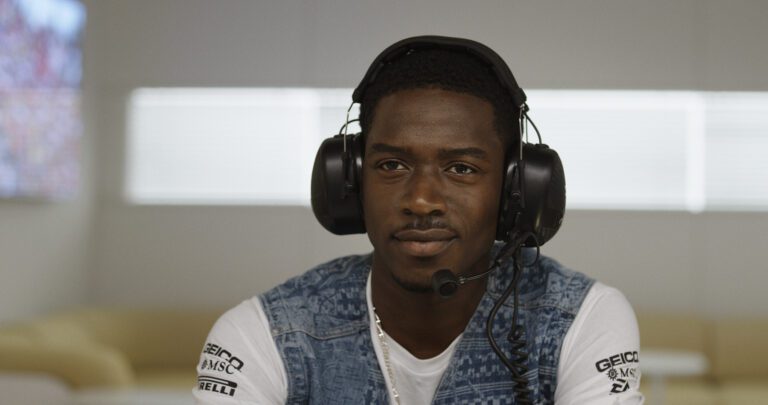Football fans may know Nate Boyer from the inspirational story of how he became a 34-year-old rookie for the Seattle Seahawks after serving overseas. Film and TV buffs might recognize the U.S. Army Green Beret veteran from his work in front of the camera in projects such as Christian Gudegast’s Den of Thieves and FX’s Mayans M.C. But when Boyer spoke with Casting Networks, it was his latest role as a filmmaker that was on the table. The multi-hyphenate co-wrote, produced, and directed the upcoming MVP, a narrative film that dramatizes how the eponymous non-profit Merging Vets & Players (MVP) came to be. Keep reading for an in-depth look at Boyer’s journey from co-founding the organization to making a film about it.
It’s great to meet you, Nate, and I’d love to start with the nonprofit itself. Your story before co-founding MVP seems to have perfectly equipped you to form a nonprofit that brings together combat veterans and former professional athletes. What from your experience serving in the military and playing with the Seattle Seahawks inspired you to combine those two groups of people?
I’d say that more than anything, it was the similarity between veterans and athletes of having experienced the comradery and brotherhood that comes from sacrificing to be elite. They also share the struggle of a certain loss of identity when the uniform comes off. You lose a common purpose, mission, and team when that happens. We can often think it’s best to just tough it out at that point and go at it alone, but that’s just not healthy. So Jay Glazer and I formed MVP to bring together these two groups of people that have respect for each other and a lot of common ground.
It sounds like it, and I especially love your perspective on it as someone who’s experienced both worlds.
Thanks, and I will say it’s important to recognize that people in the military and professional athletes have very different jobs. The battlefield and the ball field are not the same thing. But I’m telling you that when you get in a room with combat veterans and retired athletes, it’s pretty special to hear their stories and see how they connect over shared experiences. So a big purpose of MVP is to provide once more a sort of locker room for these people, where they can build a team again and encourage each other with the reminder that they’re more than the uniform they wore. The idea is that members of these communities can use all the things that got them here as they move forward into the next phase of life. For me, that means making movies — it’s what I want to do and find purpose in.
Speaking of which, what was it like stepping behind the camera for the first time with MVP?
It all started with a good friend of mine, Geraint Jones, who’s a veteran of the British military. He had come to MVP for a few of our huddles on the charity side of things about four years ago. After one of the sessions, he came up to me and asked if we could talk over lunch. We did, and he let me know that as a writer, he thought the story of MVP should be made into a film. Geraint and I started kicking around ideas, and by 2018, we had co-written a pretty strong script. One of the first places that looked at it was Sylvester Stallone’s Balboa Productions.
That’s a great place to start!
I had previously met the head of production there, Braden Aftergood, and we’d maintained a good relationship. He already knew about MVP, as did Stallone, who’d been to a couple of our sessions before and loved the charity, too. So they agreed to help make the film, which was a good jumping-off point, and then we started putting things in place. We produced it with a whole team of people that includes Sylvester Stallone, Braden Aftergood, Jared Hoffman, Mo McRae, Charles Berg, Nicholas Gibeault, Weston Scott, Jay Glazer, Joe Newcomb, J. Craig, Shanna Schanen, and Rob Schanen.
And you starred in it, too.
I was originally thinking I could play a small role in the film. I’d been to acting school and was actively taking classes at the time. Some opportunities had come my way with supporting roles in TV shows and movies. So I thought I’d be a part of the MVP cast in some capacity, especially since we wanted most all of the veterans portrayed onscreen to be played by actual veterans. The film also features athletes like Tony Gonzalez, Randy Couture, Michael Strahan, Howie Long, and Jarrod Bunch — all those guys played versions of themselves for MVP. And then my role with the film grew once Covid hit.
You filmed during the pandemic?
We did. I think everyone was getting a little antsy and frustrated with not being able to do certain things they loved. For me, that was wanting to do the project. We had a lot of industry people already on board who were willing to help and excited to just have the opportunity to make something during that time. Then I found out that the veterans’ homeless shelter we’d gotten approval to film at was going to be shutting down toward the end of 2020 and turned into something else. I really wanted to shoot there for authenticity because some of the veterans in our story had actually lived there, and a decent amount of the script takes place in that location.
Is that when you stepped in as a first-time director?
When we got the news about the veterans’ homeless shelter, I was like, “We’re just going to make this thing with whoever’s on board.” I directed, and people came through right and left to help make it happen. We started filming in LA in October of 2020 during the time that there was a little lull in Covid numbers, but the city was still pretty much shutdown. Since everything was closed, people were more willing and able to let us utilize their spaces to film.
Can you name a few examples?
We got to shoot at the American Legion in Hollywood, and Jay let us use his gym, Unbreakable Performance Center. He’s in the movie as the co-founder of MVP, of course, along with actors like Tom Arnold and Dan Lauria. They were willing to work at scale just because they loved the project and wanted to be a part of it. Plus, the NFL let us utilize some of its logos and allowed us to shoot on its LA soundstages since they weren’t being used. So while I’m not in any way happy the pandemic happened, I am grateful to have experienced people’s generosity that came out of it. As a SAG-AFTRA project, we were following all the Covid protocols, and thank the Lord that no one got Covid throughout the entire production. It all just felt meant to be, that we were able to come together during a really hard time to do something special.
It doesn’t come as a surprise that you felt a sense of unity in making the film — it seems to be one of your core values. When the Los Angeles Times asked about your advice to Colin Kaepernick to take a knee rather than sit during the national anthem, you referenced how people can believe different things but “still work together to make this place better.”
I mean, people think and believe different things, but there’s also so much everyone has in common. We all want to be loved. We all want to feel safe and have a purpose and be a part of something. We want our time on this earth to matter, to make a difference. That’s something that Colin Kaepernick and I share with everybody else on the planet. We may have different opinions about what success looks like and how to get to those goals, but we’re both trying to make the world a better place. There’s absolutely no reason we can’t come together and not only have conversations, but also take action to improve our fighting position, as we say in the military. The conversation with Colin helped me grow in so many ways and made me think about my time in Iraq and Afghanistan. From the outside looking in, I didn’t have a lot in common with the people there, but I still fought for them and alongside them. And at the end of the day, you could say that the men and women of the military failed in our efforts over there. You could say that. But we tried — we cared about humanity and did what we could.
I love how you put that, and I’m grateful for your service, Nate.
Thank you. It showed me how a team of people could stick together and keep moving forward, which is something I also felt while making this film. We just had an attitude of giving it our best and pushing past the obstacles that presented themselves. There was this common idea that no matter what came, we were going to figure it out and get it done. Time will tell how the movie does — I hope people go see MVP and like it. But what matters most is that we tried and were able to come together to make it happen.
Speaking of overcoming obstacles, you taught yourself how to play a position you didn’t know from YouTube videos while serving in Afghanistan in order to achieve your goal of playing football. And you’ve since met other aspirations with achieving success as an actor. Now having the perspective of a director, as well, do you have any advice for our actor readers on how to proactively work toward their goals?
I think the biggest limitations in life are the ones we put on ourselves. You know, I struggle with a sense of imposter syndrome every day. It’s easy to feel like a phony, like I’m way out of my league. And it’s okay to feel that. I think everybody that achieves some level of success experiences those thoughts. But you just keep going. If acting is what makes you happy, keep practicing and creating your own work, no matter the scale. You never know what it could turn into so just go do it.
The vulnerability of Boyer’s words reflects the organization he co-founded, which encourages members to open up and share during sessions. Those interested in learning more about the nonprofit can check out the MVP website. And if you want to follow along with Boyer’s continued journey with the film, you can find him on Instagram and Twitter as @nateboyer37. MVP is currently active in the marketplace, with WME Independent conducting worldwide sales for the film.
—
This interview has been edited and condensed.
Looking to get your big break? Sign up or login to Casting Networks and land your next acting role today!
Related articles:
‘Tammy’s Always Dying’: Amy Jo Johnson on Her Sophomore Directing Debut
Actress Kathrine Narducci on Casting Stereotypes and Her New Film ‘Capone’
Actress Mercedes Kilmer Discusses Her Acting Debut in Action-Crime Thriller ‘Paydirt’













